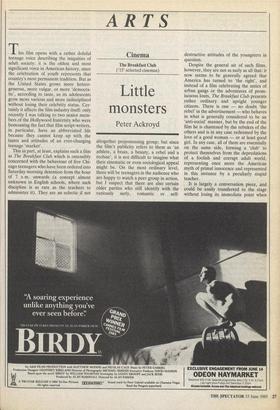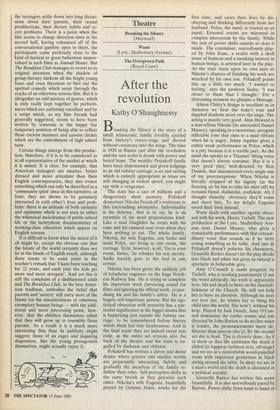ARTS
This film opens with a rather doleful teenage voice describing the iniquities of adult society: it is the oldest and most significant voice in American history, since the celebration of youth represents that country's most permanent tradition. But as the United States grows more hetero- geneous, more vulgar, or more 'democra- tic', according to taste, so its adolescents grow more various and more indisciplined without losing their celebrity status. Cer- tainly it affects the film industry itself: only recently I was talking to two senior mem- bers of the Hollywood fraternity who were bemoaning the fact that film script-writers, in particular, have an abbreviated life because they cannot keep up with the tastes and attitudes of an ever-changing teenage 'market'.
This in part, at least, explains such a film as The Breakfast Club which is ostensibly concerned with the behaviour of five Chi- cago teenagers who have been ordered into Saturday morning detention from the hour of 7 a.m. onwards (a concept almost unknown in English schools, where such discipline is as rare as the teachers to administer it). They are an eclectic if not
Cinema
The Breakfast Club ('15' selected cinemas)
Little monsters
Peter Ackroyd
altogether prepossessing group; but since the film's publicity refers to them as 'an athlete, a brain, a beauty, a rebel and a recluse', it is not difficult to imagine what their cinematic or even sociological appeal might be. On the most ordinary level, there will be teenagers in the audience who are happy to watch a peer group in action, but I suspect that there are also certain older parties who still identify with the variously surly, romantic or self-
destructive attitudes of the youngsters in question.
Despite the general air of such films, however, they are not as surly as all that: it now seems to be generally agreed that America has turned to 'the right', and instead of a film celebrating the antics of urban gangs or the adventures of prom- iscuous louts, The Breakfast Club presents rather ordinary and upright younger citizens. There is one — no doubt 'the rebel' in the advertisement — who behaves in what is generally considered to be an 'anti-social' manner, but by the end of the film he is chastened by the rebukes of the others and is in any case redeemed by the love of a good woman — or at least good girl. In any case, all of them are essentially on the same side, forming a 'club' to protect themselves from the depredations of a foolish and corrupt adult world, representing once more the American myth of primal innocence and represented in this instance by a peculiarly stupid teacher.
It is largely a conversation piece, and could be easily transferred to the stage without losing its immediate point when
the teenagers settle down into long discus- sions about their parents, their sexual predilections, their dietary habits and se cret problems. There is a point when the film seems to change direction since in the second half, having exhausted all of the conversational gambits open to them, the participants come perilously close to the kind of farcical or gross behaviour immor- talised in such films as Animal House. But The Breakfast Club manages to revert to its original intention when the shadow of group therapy darkens all the bright young faces and even threatens to blot out the spirited comedy which seeps through the cracks of an otherwise serious film. But it is altogether an odd mixture of genres, which is only really kept together by perform- ances which are uniformly excellent and by a script which, as my film friends had generally suggested, seems to have been written by someone in the happy but .temporary position of being able to reflect those current manners and current clichés which are the embodiment of high school taste.
Certain things emerge from this produc- tion, therefore, if it is to be considered as at all representative of the market at which it is aimed. It is clear, for example, that American teenagers are smarter, better dressed and more articulate than their English contemporaries; they also evince something which can only be described as a 'community spirit' since in this narrative, at least, they are shown to be genuinely interested in eath other's lives and prob- lems: there is an attitude of both curiosity and optimism which is not seen in either the whimsical melodramas of public school life or the lachrymose documentaries of working-class education which appear on English screens.
It is difficult to know what the moral of it all might be, except the obvious one that the future of the world certainly does not lie in the hands of English youth, although there seems to be some point in the teacher's remark that 'I have been teaching for 22 years, and each year the kids get more and more arrogant'. And yet this is still the complaint of a disillusioned adult and The Breakfast Club, in the best Amer- ican tradition, embodies the belief that parents and 'society' still carry most of the blame for the misadventures of otherwise exemplary human beings — with the addi- tional and more interesting point, how- ever, that the children themselves admit
that they will grow up to resemble those parents. As a result it is a much more interesting film than its publicity might suggest; those of an eager and inquiring disposition, like the young protagonists themselves, might actually enjoy it.



















































 Previous page
Previous page